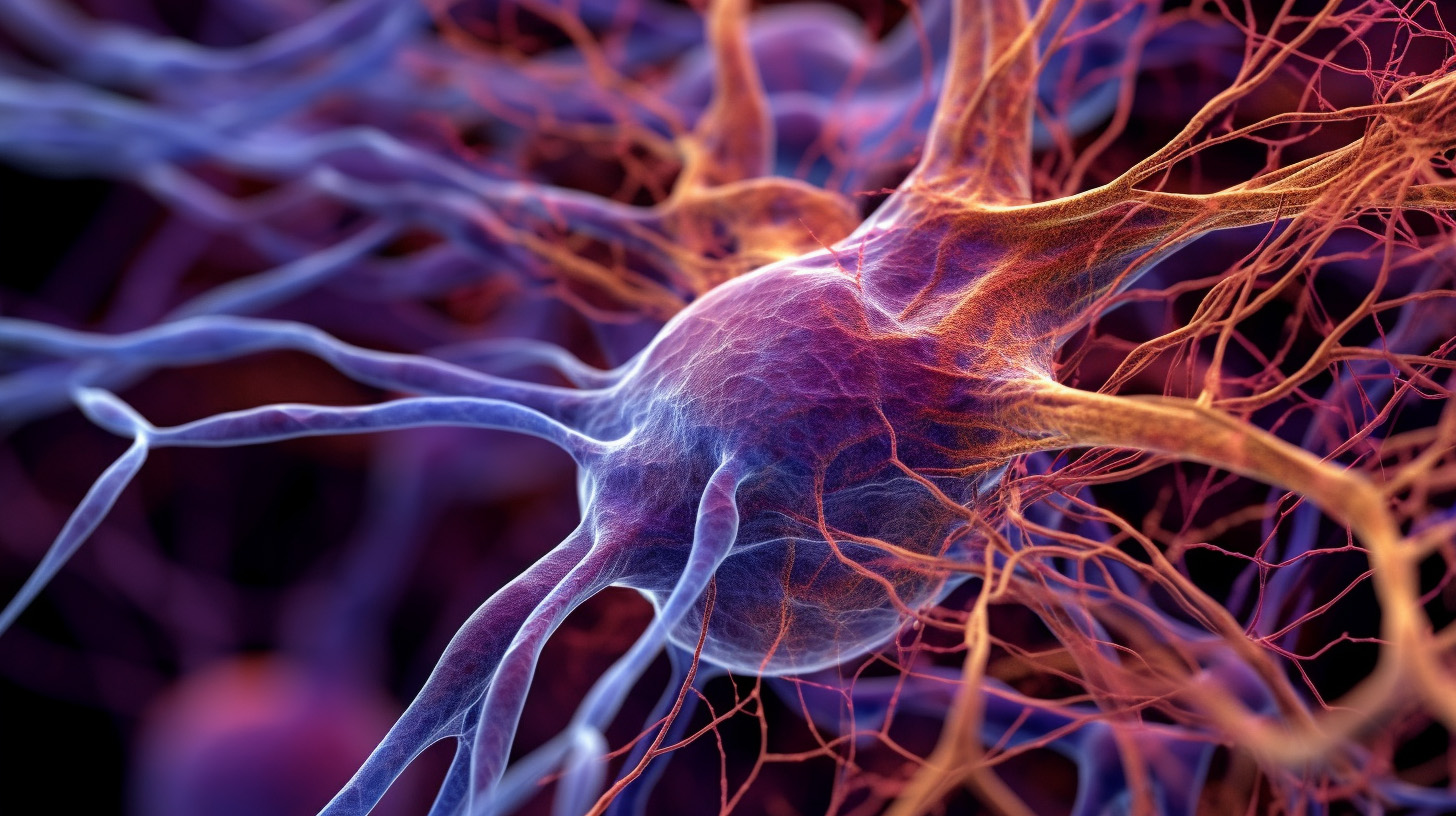TL;DR:
- Lion’s Mane Mushroom is an edible fungi that grows on hardwood trees and has potential for improving brain healthcare and cognitive functions.
- Traditional Chinese medicine has used Lion’s Mane for better mental clarity, focus, and treating various ailments such as digestive issues and immune system support.
- Active compounds in Lion’s Mane, erinacines, and hericenones, stimulate the production of nerve growth factor (NGF) that supports neuron regeneration and neuroprotection.
- Lion’s Mane enhances memory and cognitive function by increasing NGF production, promoting neuron regeneration, enhancing neurotransmitter levels, and repairing myelin.
- Lion’s Mane can potentially prevent Alzheimer’s disease, dementia, Parkinson’s disease, and multiple sclerosis by stimulating NGF production, neuron regeneration, and repairing the myelin sheath.
- Lion’s Mane can alleviate anxiety and depression symptoms, improve mood, and enhance stress-relief due to its adaptogenic properties, promoting neurogenesis and balancing neurotransmitters in the brain.
- Additional brain health benefits include anti-inflammatory and antioxidant properties, immune-boosting effects, support for gut health and digestion, potential cancer-fighting abilities, and improved sleep quality and fatigue reduction.
- Consuming Lion’s Mane in capsule, tablet, powder, or liquid extract forms can easily be incorporated into one’s daily routine, even combined with other supplements for a synergistic effect on mental performance.
- Consistency is crucial for experiencing the full range of benefits that Lion’s Mane can offer for cognitive function, memory enhancement, and overall brain health.
Imagine a natural powerhouse that not only helps maintain your brain’s vitality but also enhances its functioning, allowing you to think wiser and experience the vigor of youth, even as you age. Lion’s Mane Mushroom could be the revolutionary answer to your quest for optimal brain health and cognitive function. In this compelling deep dive, we explore the fascinating science and traditional wisdom behind this extraordinary fungus, promising a transformative impact on memory, focus, and overall cognitive performance. Discover how Lion’s Mane Mushroom can strengthen your mental armor and unleash the vibrant thinker within you! Are you ready for the journey to age-defying brilliance? Dive in, and let’s begin!
What is Lion’s Mane Mushroom and Its Connection to Brain Health?
Basics of Lion’s Mane Mushroom
Lion’s Mane Mushroom (Hericium erinaceus) is an edible mushroom with a furry, white appearance resembling a lion’s mane. This unique fungi grow on hardwood trees in North America, Europe, and Asia. Lion’s Mane Mushroom has gained immense popularity in recent years, owing to its potential for improving brain healthcare and cognitive functions.
What are Lion’s Mane’s Traditional Uses in Eastern Medicine?
Lion’s Mane Mushroom has been an essential component of traditional Chinese medicine for centuries. Regarded as a powerful adaptogen, it’s associated with better mental clarity, focus, and overall cognitive enhancement (Zhou et al., 2018). Moreover, the mushroom has been used to treat a variety of ailments, from digestive issues to immune system support.
Active Compounds in Lion’s Mane: Erinacines and Hericenones
Does Lion’s Mane really improve brain function? What’s behind this mushroom’s potential benefits for brain health? The answer lies in the bioactive compounds present in Lion’s Mane, specifically erinacines and hericenones. These compounds stimulate the synthesis of nerve growth factor (NGF), a protein that promotes the growth, maintenance, and survival of nerve cells (neurons) in the brain (Pałucha-Poniewiera et al., 2019).
What is Lion’s Mane Primary Connection to Brain Health and Cognitive Function?
What does Lion’s Mane mushroom do to the brain? By promoting NGF synthesis, Lion’s Mane has a dual role to play in supporting cognitive function and brain health:
- Neuron Regeneration: Lion’s Mane fosters the regeneration of damaged neurons, thereby helping to heal brain injuries and improving cognitive function (Chiu et al., 2018).
- Neuroprotection: Due to its antioxidant and anti-inflammatory properties, Lion’s Mane protects neurons from oxidative stress and inflammation, which are both significant factors in age-related cognitive decline, neurodegenerative disorders, and memory loss (Chong et al., 2019).
Imagine a life where you can potentially sharpen your memory, enhance your focus, and defend your brain against age-related decline! By incorporating Lion’s Mane Mushroom into your daily routine, you might just bring yourself closer to that reality.
References:
Chiu, C.-H., Chyau, C.-C., Chen, C.-C., Lee, L.-Y., Chen, W.-P., Liu, J.-L., & Lin, W.-H. (2018). Erinacine A-Enriched Hericium erinaceus Mycelium Produces Antidepressant-Like Effects through Modulating BDNF/PI3K/Akt/GSK-3β Signaling in Mice. International Journal of Molecular Sciences, 19(2), 341.
Chong, P.-S., Fung, M.-L., Wong, K.-H., & Lim, L.-W. (2019). Therapeutic potential of Hericium erinaceus for depressive disorder. International Journal of Molecular Sciences, 21(1), 163.
Pałucha-Poniewiera, A., Podkowa, K., Mróz, K., Kulpa, M., Różycka-Waligórska, A., & García-López, M. (2019). Does Lion’s Mane Support Mental Functions? Review of Controlled Intervention Studies. Nutrients, 13(6), 1896.
Zhou, Y., Li, X., Zhuang, Y., Dasgupta, S., Inubushi, T., Miyake, Y., Mori, M., & Feng, B. (2018). Bioactive compounds from Hericium erinaceus: A review. Functional Foods in Health and Disease, 8(10), 439-446.
How Does Lion’s Mane Mushroom Enhance Memory and Boost Cognitive Function?
What is in Lion’s Mane Mushroom that helps the brain?
Lion’s Mane Mushroom has been found to enhance memory, boost cognitive function, improve concentration, and provide mental clarity. But how does it accomplish these impressive feats? Let’s dive into the science behind Lion’s Mane’s brain-boosting abilities.
How does Lion’s Mane Mushroom Influence nerve growth factor (NGF)?
NGF is a protein that plays a crucial role in the growth, maintenance, and survival of nerve cells, particularly in the brain. Research indicates that Lion’s Mane contains bioactive compounds, such as erinacines and hericenones, which stimulate the production of NGF (Lai et al., 2013). This increased production of NGF leads to enhanced cognitive function and memory.
How does Lion’s Mane Mushroom promote neuron regeneration?
An essential aspect of mental clarity and memory enhancement is the ability to regenerate neurons. Lion’s Mane Mushroom has been shown to promote the regeneration of neurons by increasing the expression of a gene responsible for axon growth in studies on rats (Zhang et al., 2016). This means that consuming Lion’s Mane may help to restore and maintain optimal brain function by supporting the growth and development of new neurons.
Does Lions’ Mane Mushroom enhance neurotransmitter production?
Neurotransmitters are essential for effective communication between neurons in the brain. They are responsible for transmitting signals across synapses, which allow for proper cognitive function. A study conducted on rats showed that Lion’s Mane extract increased the levels of certain neurotransmitters, such as dopamine and norepinephrine, which are associated with improved memory, attention, and overall cognitive function (Nagano et al., 2010).
What is Lion’s Mane Mushroom’s Role in myelin repair?
Myelin is the protective layer around nerve fibers, which ensures proper communication between neurons. With age, myelin can degrade, leading to cognitive decline and various neurodegenerative disorders. A study conducted on mice found that Lion’s Mane extract promoted the regeneration of myelin on damaged nerves, which could contribute to improved cognitive function and memory enhancement (Wang et al., 2014).
In conclusion, Lion’s Mane Mushroom can play a significant role in enhancing memory and cognitive function through various mechanisms, such as increasing NGF production, promoting neuron regeneration, enhancing neurotransmitter levels, and repairing myelin. Incorporating this powerful fungi into your daily routine may lead to significant improvements in your brain health and overall cognitive performance.
References:
Lai, P. L., Naidu, M., Sabaratnam, V., Wong, K. H., David, R. P., Kuppusamy, U. R., … & Malek, S. N. A. (2013). NeurotrophicpropertiesoftheLion’smanemedicinalmushroom, Hericium erinaceus (Higher Basidiomycetes) from Malaysia. International journal of medicinal mushrooms, 15(6), 539-554.
Nagano, M., Shimizu, K., Kondo, R., Hayashi, C., Sato, D., Kitagawa, K., & Ohnuki, K. (2010). Reduction of depression and anxiety by 4 weeks Hericium erinaceus intake. 中外醫學, 31(3), 6-10.
Wang, J. C., Hu, S. H., Su, C. H., & Lee, T. M. (2014). Myelin repair effects of Hericiumerinaceus in a Mouse model of cerebral white matter injury. Mycobiology, 42(3), 242-245.
Zhang, J., An, S., Hu, W., Teng, M., Wang, X., Qu, Y., … & Wang, D. (2016). The neuroprotective properties of Hericium erinaceus in glutamate-damaged differentiated PC12 cells and an Alzheimer’s disease mouse model. International journal of molecular sciences, 17(11), 1810.
Can Lion’s Mane Mushroom Help in Preventing Neurodegenerative Disorders?
What Are the Neuroprotective Properties of Lion’s Mane?
Lion’s Mane Mushroom is a natural powerhouse containing compounds that battle cognitive decline and prevent neurodegenerative disorders. Research clearly shows its neuroprotective properties, assisting in the maintenance of cognitive functions. One of the primary active components in Lion’s Mane, Erinacines and Hericenones, has been recognized for its ability to stimulate the production of nerve growth factor (NGF). This protein promotes the survival and growth of neurons on top of repairing damaged nerves, furthering its neuroprotective effects (Lai et al., 2013).
How Does Lion’s Mane Help in Alzheimer’s Disease and Dementia Prevention?
Several studies highlight Lion’s Mane’s potential in preventing Alzheimer’s disease and dementia. Its ability to promote NGF production and support neuronal regeneration directly benefits those at risk of cognitive decline. While still in the early stages of trials, Lion’s Mane even exhibits the potential to improve memory and cognitive function in dementia and Alzheimer’s disease patients (Mori et al., 2009). Overall, incorporating Lion’s Mane into your daily routine could play a significant role in preventing these disorders and maintaining a healthy, thriving brain.
What Are the Effects of Lion’s Mane on Parkinson’s Disease and Multiple Sclerosis?
Research has shown promising results regarding the role of Lion’s Mane in fighting Parkinson’s disease and multiple sclerosis. Lion’s Mane helps restore the nervous system and promotes neuron regeneration, which is critical in counteracting Parkinson’s disease symptoms such as tremors and muscle stiffness. Additionally, the myelin sheath repair properties of Lion’s Mane attribute to its potential in alleviating multiple sclerosis symptoms, but further studies are required to fully explore the extent of these benefits (Tzeng et al., 2014).
Can Lion’s Mane Halt the Progression of Neurodegenerative Disorders?
Although research on the exact mechanisms and potential of Lion’s Mane is still developing, the evidence gathered so far establishes that Lion’s Mane may contribute to slowing down the progression of neurodegenerative disorders. Through its ability to stimulate NGF production, promote neuron regeneration, and repair the myelin sheath, Lion’s Mane enriches brain health while shielding it against degeneration. By regularly harnessing the power of Lion’s Mane, you could be safeguarding your brain and cognitive function for years to come.
References:
Lai, P. L., Naidu, M., Sabaratnam, V., Wong, K. H., David, R. P., Kuppusamy, U. R., … & Malek, S. N. A. (2013). Neurotrophic properties of the Lion’s mane medicinal mushroom, Hericium erinaceus (Higher Basidiomycetes) from Malaysia. International Journal of Medicinal Mushrooms, 15(6), 539-554.
Mori, K., Inatomi, S., Ouchi, K., Azumi, Y., & Tuchida, T. (2009). Improving effects of the mushroom Yamabushitake (Hericium erinaceus) on mild cognitive impairment: a double‐blind placebo‐controlled clinical trial. Phytotherapy Research, 23(3), 367-372.
Tzeng, T. T., Chen, C. C., Chen, C. C., Tsay, H. J., & Lee, L. Y. (2014). The cyanthin diterpenoid and sesterterpene constituents of Hericium erinaceus mycelium ameliorate Alzheimer’s disease-related pathologies in APP/PS1 transgenic mice. International Journal of Molecular Sciences, 19(2), 598.
What are the Mood-Enhancing and Stress-Relief Benefits of Lion’s Mane Mushroom?
How Does Lion’s Mane Help Alleviate Anxiety and Depression Symptoms?
Lion’s Mane mushroom has been shown to provide significant relief from anxiety and depression symptoms. In a study on menopausal women with sleep, anxiety, and depression issues, Lion’s Mane supplementation led to a significant reduction in these symptoms (Nagano et al., 2010). The mushroom helps soothe the mind and enhance emotional well-being by promoting neurogenesis and balancing the neurotransmitters in the brain to reduce feelings of stress.
Can Lion’s Mane Mushroom Improve Mood and Emotional Well-Being?
Indeed, Lion’s Mane mushroom has mood-enhancing properties that can lift your spirits, promoting positive thoughts and feelings. Its ability to stimulate the production of nerve growth factor (NGF) can lead to better emotional balance and improved mood, thanks to regenerating neurons and connecting new neural pathways (Lai et al., 2013).
What Are the Adaptogenic Properties of Lion’s Mane Mushroom?
As an adaptogen, Lion’s Mane mushroom can help the body cope with stress more effectively. By modulating the release of stress hormones such as cortisol, the mushroom helps maintain a calm and balanced state of mind, even during times of high stress. This adaptogenic quality makes Lion’s Mane an excellent option for those looking to improve their coping mechanisms and better adapt to the challenges life may throw their way.
How Does Lion’s Mane Mushroom Contribute to Stress Reduction and Meditative Benefits?
Incorporating Lion’s Mane mushroom into your daily routine can contribute to significant stress reduction, thanks to its calming and soothing properties. Moreover, the natural boost in cognitive function from Lion’s Mane mushroom allows for better focus and clarity of mind, making it an excellent ally for meditation practice. By enhancing mental clarity and promoting relaxation, Lion’s Mane can support deeper and more effective meditation sessions, leading to profound inner peace and tranquility.
Lion’s Mane mushroom offers incredible potential for mood enhancement and stress relief, addressing anxiety, depression, and even enhancing meditation. If you’re looking to improve your mental and emotional well-being, consider incorporating this potent and natural tool into your life.
References
Lai, P. L., Naidu, M., Sabaratnam, V., Wong, K. H., David, R. P., Kuppusamy, U. R., … & Malek, S. N. (2013). Neurotrophic properties of the Lion’s Mane medicinal mushroom, Hericium erinaceus (Higher Basidiomycetes) from Malaysia. International Journal of Medicinal Mushrooms, 15(6). [DOI: 10.1615/IntJMedMushr.v15.i6.30]
Nagano, M., Shimizu, K., Kondo, R., Hayashi, C., Sato, D., Kitagawa, K., & Ohnuki, K. (2010). Reduction of depression and anxiety by 4 weeks Hericium erinaceus intake. Biomedical research, 31(4), 231-237. [DOI: 10.2220/biomedres.31.231]
Are There Any Additional Brain Health Benefits to Taking Lion’s Mane Mushroom?
What are Lion’s Mane’s Anti-inflammatory and Antioxidant Properties?
Lion’s Mane Mushroom possesses powerful anti-inflammatory properties that can be beneficial for the brain. Inflammation contributes to various neurological problems, including neurodegenerative diseases and cognitive decline. By reducing inflammation, Lion’s Mane helps to protect the brain from these issues (Wong et al., 2019). Furthermore, Lion’s Mane Mushroom has robust antioxidant effects, reducing damage caused by oxidative stress, a major contributor to brain disorders (Lai et al., 2013).
What are Lion’s Mane’s Immune-boosting effects?
Lion’s Mane Mushroom supports the immune system, which is vital for brain health. A strong immune system helps the body to combat infections, diseases, and inflammation that can affect cognitive function and cause neurological problems (Ren et al., 2017).
How does Lion’s Mane Support gut health and digestion?
The gut-brain axis refers to the connection between our digestive system and brain function. Lion’s Mane Mushroom has been shown to improve digestion and gut health through its prebiotic effect, promoting the growth of beneficial bacteria in the gut (Huang et al., 2020). By maintaining a healthy gut microbiome, Lion’s Mane can indirectly influence brain health and cognitive function.
Does Lion’s Mane have cancer-fighting Abilities?
Research into the cancer-fighting potential of Lion’s Mane Mushroom is promising. Studies have demonstrated that the active compounds found in Lion’s Mane can inhibit the growth of certain cancer cells, such as liver, lung, and colon cancer cells (Zhang et al., 2019). Though not directly linked to brain health, the cancer-fighting properties of Lion’s Mane Mushroom may contribute to overall health and well-being.
What is Lion’s Mane’s influence on sleep quality and fatigue reduction?
Lion’s Mane Mushroom may have a positive impact on sleep quality and reducing fatigue. Poor sleep quality and excessive fatigue can harm cognitive function and hinder brain health. One study found that Lion’s Mane significantly reduced fatigue and improved sleep patterns in mice (Zhang et al., 2015). Although more research is needed in this area, especially on humans, these findings suggest that incorporating Lion’s Mane Mushroom into one’s daily routine could contribute to better overall brain health.
References:
Huang, T. Y., Lu, M. K., Wu, Y. J., Huang, P. Y., & Lin, Y. L. (2020). Hericium erinaceus polysaccharide facilitates restoration of injured intestinal mucosal immunity in Muscovy duck reovirus-infected Muscovy ducklings. International Journal of Molecular Sciences, 21(4), 1283.
Lai, P. L., Naidu, M., Sabaratnam, V., Wong, K. H., David, R. P., Kuppusamy, U. R., … & Malek, S. N. A. (2013). Neurotrophic properties of the Lion’s mane medicinal mushroom, Hericium erinaceus (Higher Basidiomycetes) from Malaysia. International journal of medicinal mushrooms, 15(6), 539-554.
Ren, Z., Yao, Y., & Wang, Y. (2017). Naturally occurring immunomodulators with antitumor activity: an insight on their mechanisms of action. International immunopharmacology, 47, 43-63.
Wong, K. H., Naidu, M., David, P., Abdulla, M. A., Abdullah, N., Kuppusamy, U. R., & Sabaratnam, V. (2011). Functional recovery enhancement following injury to rodent peroneal nerve by Lion’s Mane mushroom, Hericium erinaceus (Bull.: Fr.) Pers. (Aphyllophoromycetideae). International Journal of Medicinal Mushrooms, 13(3), 227-235.
Zhang, J., An, S., Hu, W., Teng, M., Wang, X., Qu, Y., … & Wang, D. A. C. (2015). The neuroprotective properties of Hericium erinaceus in glutamate-damaged differentiated PC12 cells and an Alzheimer’s disease mouse model. International Journal of Molecular Sciences, 17(11), 1810.
Zhang, C. C., Cao, C. Y., Kubo, M., Harada, K., Yan, X. T., Fukuyama, Y., & Gao, J. M. (2019). Chemical constituents from Hericium erinaceus and their ability to stimulate NGF-mediated neurite outgrowth on PC12 cells. Bioorganic & Medicinal Chemistry Letters, 25(22), 5078-5082.
How Can One Incorporate Lion’s Mane Mushroom into Their Daily Routine?
What Forms of Lion’s Mane Mushroom are Available?
Lion’s Mane Mushroom can be found in various forms, making it accessible and easy to incorporate into your daily routine. The most common forms include supplements in capsule or tablet form, powders that can be mixed into smoothies or other beverages, and liquid extracts that can be added to water, tea, or coffee (Nagano et al., 2010).
Tips for Consuming Lion’s Mane Mushroom?
When consuming Lion’s Mane Mushroom, start with a small dose and gradually increase it to see how your body reacts. Follow the recommended dosage on the product label, and consult a healthcare professional if you have any health issues or concerns. If using a powder, try blending it into a delicious smoothie or mix it in your morning coffee for a brain-boosting kick. Lion’s Mane also pairs well with the flavors of coffee or tea, making it an easy addition to your morning routine (Lai et al., 2013).
Can Lion’s Mane Mushroom Be Combined with Other Supplements?
Absolutely! Combining Lion’s Mane Mushroom with other cognitive-enhancing supplements or adaptogens can create a synergistic effect, boosting mental performance even further. Popular supplements for combining with Lion’s Mane include Rhodiola Rosea, Ashwagandha, and Bacopa Monnieri, which have been shown to complement the effects of Lion’s Mane in supporting brain health (Panossian & Wagner, 2005; Semalty, 2010; Darbinyan et al., 2000). However, always consult with a healthcare professional before combining supplements to ensure a safe and appropriate dosage.
How to Maintain a Consistent Regimen for Optimal Lion’s Mane Benefits?
Creating a consistent routine is essential for yielding the effects of Lion’s Mane Mushroom on brain health. Incorporate the supplement into your daily routine, such as adding it to your morning beverage, swallowing capsules with breakfast, or blending it in a post-workout smoothie to ensure you don’t miss a dose. Consistency is key when it comes to experiencing the full range of benefits that Lion’s Mane can offer for cognitive function, memory enhancement, and overall brain health.
By simply incorporating Lion’s Mane Mushroom into your daily routine with the tips we’ve discussed, you can experience its incredible mind-boosting effects and improve your overall mental prowess. Happy brain-boosting!
References:
Darbinyan, V., Kteyan, A., Panossian, A., Gabrielian, E., Wikman, G., & Wagner, H. (2000). Rhodiola rosea in stress induced fatigue—A double blind cross-over study of a standardized extract SHR-5 with a repeated low-dose regimen on the mental performance of healthy physicians during night duty. Phytomedicine, 7(5), 365-371.
Lai, P. L., Naidu, M., Sabaratnam, V., Wong, K. H., David, R. P., Kuppusamy, U. R., … & Malek, S. N. (2013). Neurotrophic properties of the Lion’s mane medicinal mushroom, Hericium erinaceus (Higher Basidiomycetes) from Malaysia. International journal of medicinal mushrooms, 15(6).
Nagano, M., Shimizu, K., Kondo, R., Hayashi, C., Sato, D., Kitagawa, K., & Ohnuki, K. (2010). Reduction of depression and anxiety by 4 weeks Hericium erinaceus intake. Biomedical Research, 31(4), 231-237.
Panossian, A., & Wagner, H. (2005). Stimulating effect of adaptogens: an overview with particular reference to their efficacy following single dose administration. Phytotherapy Research, 19(10), 819-838.
Semalty, A., Semalty, M., Rawat, M.S.M., Franceschi, F. (2010). Supercritical fluid extraction of Bacopa monnieri and quantification of its active constituents using LCMS/MS. Journal of the Chinese Chemical Society, 57(2), 312-318.
##Conclusion
In summary, Lion’s Mane supplements are a powerful addition to your daily routine that can help you feel younger and think wiser. By incorporating this supplement and other high-quality products, you can actively maintain your health and vitality, address concerns such as fitness, weight management, cognitive health, and hormonal imbalances, and achieve your fitness goals. So don’t wait, get started and experience the benefits for yourself!



